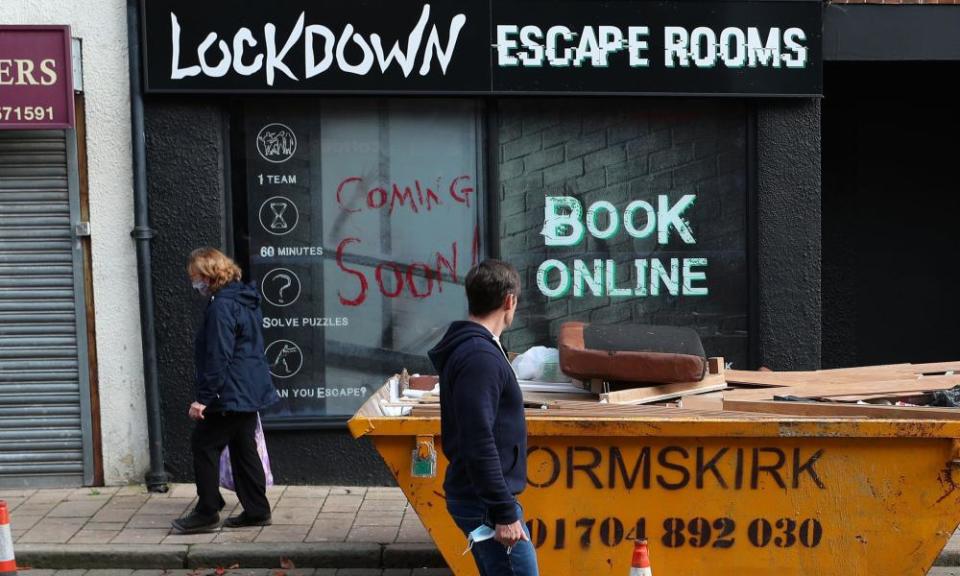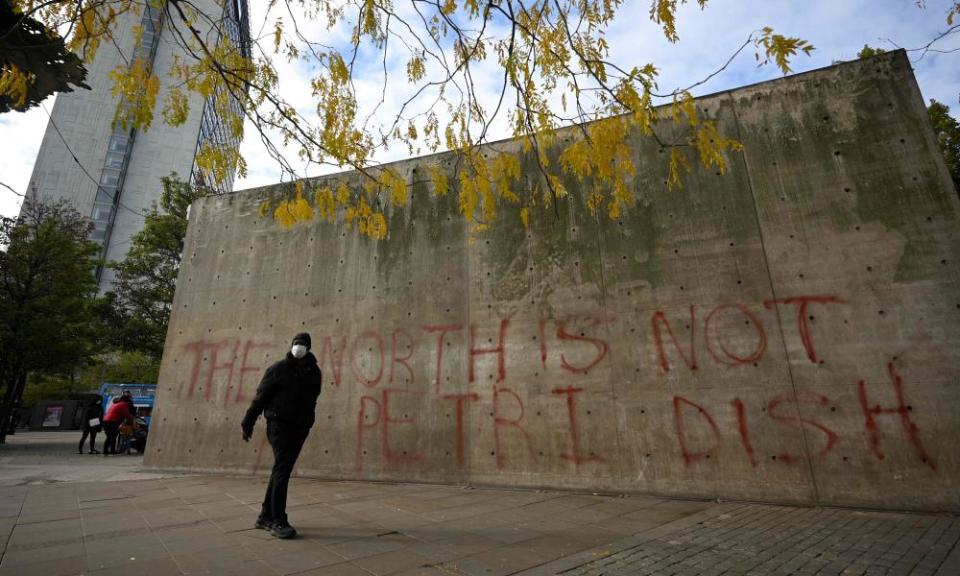'It’s all about putting the blame on us': Lancashire's reluctant path to tier 3 deal

There was no lie-in for Lancashire’s leaders on Friday. The agenda for their 7am meeting: should the Red Rose County consent to joining Liverpool in the land of temperance with tier 3 restrictions? If so, at what price?
As the sun rose, five of Lancashire’s 14 local councils were holding out for more. Pendle, famed as the birthplace of the Quaker movement and the persecution of witches, wasn’t keen. Nor was Preston, whose socialist leader, Matthew Brown, was once praised for turning his city into “Corbynism on Earth”.
There was no time for breakfast before they called Downing Street to talk to Sir Ed Lister, Boris Johnson’s chief strategic adviser. Lister was in a hurry, said Paul Foster, the leader of South Ribble council, who remained opposed to the deal, believing “it’s all about putting the blame on us”.
Related: Pubs to close in Lancashire as tier 3 Covid strategy reluctantly accepted
“Do you want to know why they were so desperate to do a deal with us before midnight?” said a furious Foster after the meeting. “To stop all the Scousers from coming over to watch the football on the weekend.”
The previous day, Rosie Cooper, the Labour MP for West Lancashire, had warned the health secretary, Matt Hancock, that the Liverpool-Everton derby on Saturday risked a Scouse invasion of pubs in her constituency, a potential “super-spreading event leading to a public health disaster”.

Back on the call, No 10 had landed on a “divide and conquer” strategy: those leaders who agreed to go into tier 3 would get money to prop up shuttered businesses, while those who refused would get none.
“They were trying to play us off against each other,” said Foster. “I wasn’t happy about it,” said Mohammed Iqbal, Pendle’s Labour leader. But he relented because “I can’t have businesses in my patch getting nothing and businesses down the road in Burnley getting support.”
The unhappy deal came at 9.45am. At 10am the leaders were invited to a phone call with Johnson, which Brown and Foster both boycotted. “I wasn’t going to listen to Boris Johnson thank me for ‘doing the right thing’ when clearly we had been bullied and cajoled and blackmailed,” complained Foster.
At 11.26 the Department of Health and Social care (DHSC) released a statement saying that Lancashire was to go into tier 3 at midnight. The small print revealed that the Lancastrians had negotiated something of a boutique deal. There was a specific clause about car boot sales being banned and soft play centres closed. And unlike in Liverpool, Lancashire’s gyms and leisure centres would stay open.
Related: Boris Johnson wrongly suggests new rules will stop some parents seeing children
The last nugget prompted an immediate howl from over the border in Merseyside, with the Liverpool mayor, Joe Anderson, demanding immediate clarification for the “inconsistent mess” which had effectively resulted in a “tier 3A and tier 3B”.
Downing Street soon said it was up to regional leaders to decide whether gyms should be closed as part of tier 3 restrictions.

The DHSC press release did not tell the whole story of what Lancashire had negotiated. It said the county would receive a support package worth £12m and that “the government will also establish a dedicated, ministerial-led taskforce with additional funding”.
“The end figure is actually £42m, but they don’t want to broadcast that because they think Manchester and Liverpool and everyone else will be queueing up for it too,” Iqbal said. “The £12m is for track and trace and enforcement and the £30m is for business support.”
The sticking point is how long that money needs to last and what they spend it on. “As far as I’m concerned, it’s for four weeks, but the government is saying we can spend it over six months,” said Foster.
Across the border in Greater Manchester, a gulf remained between what the region wanted and what the government was prepared to give.
At 1pm the chief executives of the 10 local councils had a meeting with the Cabinet Office and emerged none the wiser about what remain Greater Manchesters’ three big areas of concern: more clarity over the epidemiology of tier 3, given that the chief medical officer, Chris Whitty, had admitted he wasn’t confident it would work; a far more generous financial package (“There’s a £62m gap per month to fund the difference between what they’ve offered and what we want,” said one council leader); and, crucially, the exit strategy.
At 4pm, Johnson’s televised address was watched by Burnham and colleagues during their own meeting on Microsoft Teams, leading to some confusion over what the prime minister was saying. One person on the call likened it to the Monty Python “blessed are the cheesemakers” sketch, with leaders mishearing salient bits of Johnson’s statement and asking: “Did he say impose or intervene? … Did he say Steve Rotheram is brilliant?”
Related: Wales facing 'circuit breaker' lockdown of two or three weeks
Afterwards, Sean Fielding, the leader of Oldham council, was unimpressed at the way the prime minister repeatedly singled out Burnham for opposing extra measures. “You’d expect him to criticise Andy Burnham and Labour council leaders, but the views he is criticising are shared by GM’s nine Tory MPs and the Bolton Tory leader. Doesn’t seem very smart for him to alienate them,” said Fielding.
Friday had also begun with newspaper reports suggesting large parts of north-east England were also heading for tier 3.
In a 10.30am meeting with England’s deputy chief medical officer, Jonathan Van-Tam, the north-east leaders raised concerns that the government’s data gave a misleading picture of the infection rate. Some of the data was “two or three weeks old,” said one leader, and vastly inflated the risk to the over-60s and the consequent implications for the NHS.
After considering the councils’ own data, and hearing from local hospital bosses who said they were confident that the NHS would not be overwhelmed, Van-Tam conceded that the north-east’s infection rate had stabilised and might be falling. On that basis, they were allowed to remain in tier 2 until at least next Friday.
In Liverpool, fury reigned. Johnson once again seemed to go out of his way to praise Rotheram, knowing full well that such an endorsement would be the opposite of a vote winner for the Labour mayor.
With Burnham and Jamie Driscoll, the North of Tyne mayor, Rotheram put out a statement insisting they would fight together “for what’s right”. But it was hard to avoid the feeling that of all the dubious deals struck this week, Liverpool’s was the rawest.

 Yahoo News
Yahoo News 